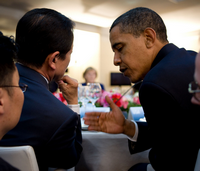The debate over whether or not we have entered a "post-American world" has, at least in U.S. circles, become predictably stale. In one corner are those sneeringly referred to by their opponents as the "declinists" -- a more neutral label might be "post-primacists" -- who trot out all sorts of facts and figures demonstrating the debilitating costs of America's imperial overstretch, and argue that the torch of global leadership is passing to new aspirants hungry for the job. In the other corner are the perennial optimists, who have their own statistics to show that even if the U.S. is facing some bad numbers, every other great power is in an even worse boat. Moreover, the optimist camp argues, most countries in the world still prefer American global leadership to having Moscow, Beijing, or any other rising contender setting the world's agenda. All of these arguments were on display at the recent Current Strategy Forum hosted by the Naval War College.
Both sides, in a way, are right. The period of the 1990s, in retrospect, was but a "pause from history," in that, for a brief period of time, the other major power centers of the world were either in disarray (Russia emerging from the collapse of the Soviet Union, China dealing with the aftermath of Tiananmen Square) or still in the process of emerging (the EU, India, and Brazil). Since then, other powers have indeed risen, but the United States still retains a commanding position on the world stage and an extraordinary capacity for regeneration.
What should be examined instead is whether the model of U.S. global leadership that emerged during the Clinton administration is sustainable. Josef Joffe characterized that system (.pdf) as one in which other powers relate "to the United States as spokes do to a hub, as players to a conductor." In this view, only Washington "was capable of coordinating the other power centers."

